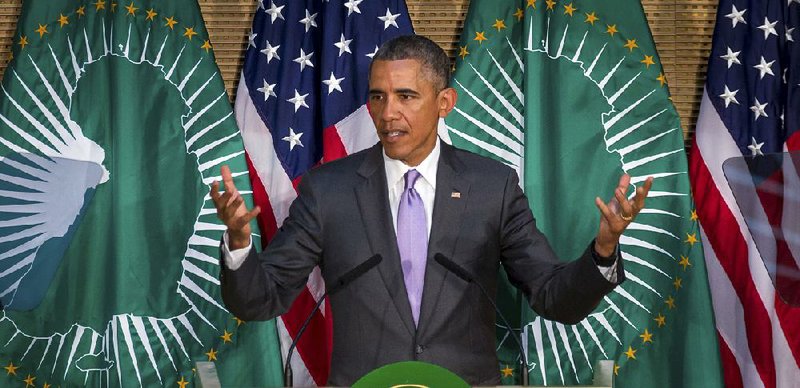ADDIS ABABA, Ethiopia -- President Barack Obama confronted the power structures of Africa on Tuesday and called for long-entrenched leaders to step down, using his stature as the first American president with African roots to try to reshape the continent's politics.
As he wrapped up his trip to Africa, Obama took on one of the region's most enduring obstacles to democratic progress: its history of one-man rule by presidents and potentates who enrich themselves and hang onto power for years, if not decades, in calcified regimes.
"Nobody should be president for life," Obama said in a speech at the African Union, the continent's umbrella organization. "Your country is better off if you have new blood and new ideas. I'm still a pretty young man, but I know that somebody with new energy and new insights will be good for my country. It will be good for yours, too, in some cases."
Just 18 months from leaving office under the Constitution's two-term limit, Obama used himself as a model for giving up power.
"I actually think I'm a pretty good president," he said. "I think if I ran, I could win."
"There's a lot that I'd like to do to keep America moving," he added. "But the law is the law, and no person is above the law, not even the president."
The comments reflect a bitter issue in Africa: the attempts by some leaders to hold onto power well after their terms expire. It is a theme Obama struck forcefully during his visit to Ghana in 2009, when he declared, "Africa doesn't need strongmen. It needs strong institutions."
The debate over longtime rulers has continued to reverberate across the continent.
Earlier this month, the Burundian President Pierre Nkurunziza pushed ahead with elections that gave him a third term in office, throwing his nation into upheaval.
The government of Burkina Faso collapsed last fall when protesters surged through the streets, denouncing President Blaise Compaore's plans to extend his 27-year rule. In Rwanda, lawmakers voted this month to support a constitutional change allowing President Paul Kagame a third term. And in the Democratic Republic of Congo, there are concerns that President Joseph Kabila will try to circumvent the two-term limit outlined in the constitution by delaying the 2016 presidential elections.
About half of the more than 50 countries in the African Union have presidents, prime ministers or monarchs who have been in power longer than Obama, some of them for decades. Teodoro Obiang Nguema Mbasogo has ruled Equatorial Guinea since 1979. Robert Mugabe has been in power in Zimbabwe since 1980. Paul Biya has governed Cameroon since 1982.
But there have been transformative moments recently. In Nigeria, the continent's most populous nation, Africans celebrated in the spring when the party that had governed since the end of military rule peacefully stepped down after losing elections, a successful transfer of power in one of the world's largest democracies. Unable to travel to Nigeria because of security concerns, Obama marked that transition by hosting the new Nigerian president, Muhammadu Buhari, in the Oval Office last week.
"When a leader tries to change the rules in the middle of the game just to stay in office, it risks instability and strife, as we've seen in Burundi," Obama said Tuesday. "And this is often just a first step down a perilous path. And sometimes you'll hear leaders say, 'Well, I'm the only person who can hold the nation together.' If that's true, then that leader has failed to truly build their nation."
Joseph Atta-Mensah, a Ghanaian who is a policy adviser at the United Nations Economic Commission for Africa, said Obama's message was important.
"One of the most important things was, in terms of good governance and institutions, the need for people to leave when their term is up," he said. "They should leave and allow for new blood. I think that was good."
In boasting that he could win another term if the 22nd Amendment did not forbid it, Obama mirrored comments President Bill Clinton has made in the past. But unlike Clinton, who often said he would have loved to have remained as president, Obama echoed his immediate predecessor, President George W. Bush, in talking wistfully of what he was looking forward to after leaving office.
"I'll be honest with you," he said, "I'm looking forward to life after being president. I won't have such a big security detail all the time. It means I can go take a walk. I can spend time with my family. I can find other ways to serve. I can visit Africa more often."
While in Kenya during the Africa trip, Obama was forced to stay in tightly controlled facilities and venues, unable to explore Nairobi or visit the village where his family is from. His step-grandmother told reporters that she urged him to go to the family village to pray at his father's grave. He later told reporters that a dinner with relatives was spent "begging for forgiveness" that he could not be with them more.
Information for this article was contributed by Jacey Fortin and Adam Nossiter of The New York Times.
A Section on 07/29/2015
